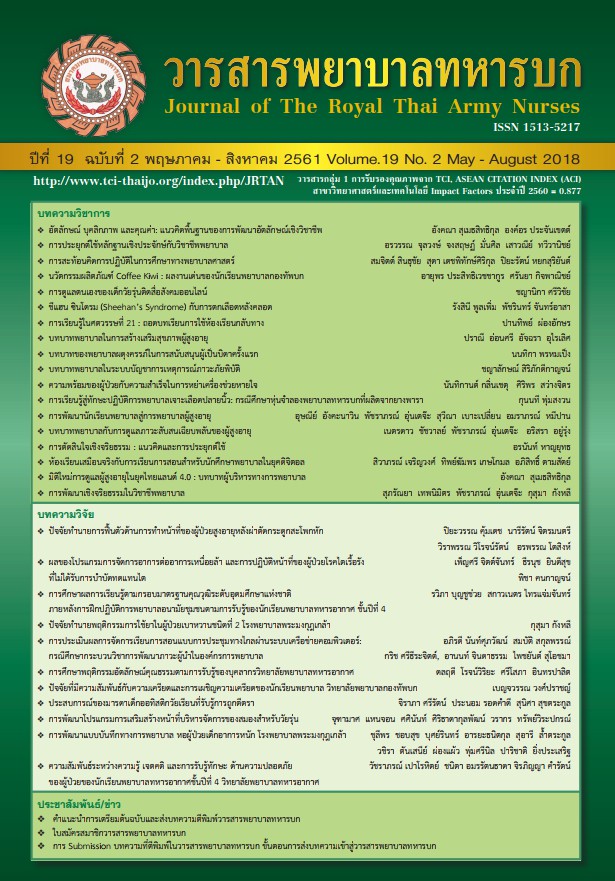The Nrses Role in Delirium Management in Older Persons
Keywords:
Elderly, Delirium, Nurses roleAbstract
Delirium is frequency often develop in a hospital especially in elderly patients. Older people usually have chronic diseases. When these conditions become worse and need for the care in a hospital, this group of patients often develops a delirium. Numerous studies indicate that the delirium has many negative outcomes for older patients such as a prolonged hospitalization and an increased mobility and mortality rates. A nurse is in an important position with a role to take care of patients as a bedside caregiver. If nurses have knowledge, understanding, awareness or recognition of delirium, identify all possible risk factors and provide appropriate management to change those modifiable risk factors and can use delirium screening tools for early detection, the incident of delirium and the negative outcomes of older patients will decrease.
Downloads
References
2. Young J, Inouye SK. Delirium in older people. British Medical Journal. 2007;334(7598):842-6.
3. Hare M, Wynaden D, McGowan S, Landsborough I, Speed G. A questionnaire to determine nurses’ knowledge of delirium and its risk factors. Contemporary Nurse. 2008;29(1):23-31.
4. Koster S, Hensens AG, Schuurmans MJ, van der Palen J. Risk factors of delirium after cardiac surgery: A systematic review. European Journal of Cardiovascular Nursing 2011;10(4):197-204.
5. Meako ME, Thompson HJ, Cochrane BB. Orthopaedic nurses’ knowledge of delirium in older hospitalized patients. Orthopaedic Nursing / National Association of Orthopaedic Nurses. 2011;30(4):241-8.
6. Foreman MD. Acute confusional states in hospitalized elderly: A research dilemma. Nursing Research. 1986;35(1):34-8.
7. Inouye SK, Foreman MD, Mion LC, Katz KH, Cooney JLM. Nurses’ recognition of delirium and its symptoms: Comparison of nurse and researcher ratings. Archives of Internal Medicine. 2001;161(20):2467-73.
8. American Psychiatric Association. Diagnostic and statistical manual of mental disorders: DSM-5. Arlington, VA: American Psychiatric Association; 2013.
9. Lipowski ZJ. Delirium: Acute confusional states. New York: Oxford University Press; 1990.
10. Inouye SK. Predisposing and precipitating factors for delirium in hospitalized older patients. Dementia and Geriatric Cognitive Disorders. 1999;10(5):393-400.
11. Anderson D. Preventing delirium in older people. British Medical Bulletin. 2005;73(1):25-34.
12. Lin Y, Chen J, Wang Z. Meta-analysis of factors which influence delirium following cardiac surgery. Journal of Cardiac Surgery. 2012;27(4):481-92.
13. Victorian Government Department of Human Services. Clinical practice guidelines for the management of delirium in older people. Melbourne: Clinical Epidemiology and Health Service Unit and Melbourne Hospital; 2006.
14. Inouye SK. Delirium in older persons. The New England Journal of Medicine. 2006;354(11): 1157-65.
15. Holly C, Cantwell ER, Jadotte Y. Acute delirium: Differentiation and care. Critical Care Nursing Clinics of North America. 2012;24(1):131-47.
16. Devlin JW, Fong JJ, Fraser GL, Riker RR. Delirium assessment in the critically ill. Intensive Care Medicine. 2007;33(6):929-40.
17. Inouye SK, van Dyck CH, Alessi CA, Balkin S, Siegal AP, Horwitz RI. Clarifying confusion: The confusion assessment method. A new method for detection of delirium. Annals of Internal Medicine. 1990;113(12):941-8.
18. Elie M, Rousseau F, Cole M, Primeau F, McCusker J, Bellavance F. Prevalence and detection of delirium in elderly emergency department patients. Canadian Medical Association Journal 2000;163(8):977-81.
19. McCrow J. The impact of a model of nurse education to improve knowledge and recognition of delirium in older persons by registered nurses: Queensland University of Technology; 2012.
20. Sogprasert S, Somboontanont, W., Visavajarn, P., Siritipakorn, P. . The effect of a clinical nursing practice guideline on prevention of delirium among hospitalized elderly patients at a university hoapital. J NURS SCI. 2015;33(1): 60-8.
21. Wakamura T, Tokura H. Influence of bright light during daytime on sleep parameters in hospitalized elderly patients. Journal of physiological anthropology and applied human science. 2001;20(6):345-51.
22. Meagher DJ, O’Hanlon D, O’Mahony E, Casey P. The use of environmental strategies and psychotropic medication in the management of delirium. The British journal of psychiatry. 1996;168(4):512-5.
23. O’Mahony R, Murthy L, Akunne A, Young J. Synopsis of the National Institute for Health and Clinical Excellence guideline for prevention of delirium. Annals of internal medicine. 2011;154(11):746-51.
24. Martinez FT, Tobar C, Beddings CI, Vallejo G, Fuentes P. Preventing delirium in an acute hospital using a non-pharmacological intervention. Age and ageing. 2012;41(5):629-34.
25. Osse RJ, Tulen JH, Bogers AJ, Hengeveld MW. Disturbed circadian motor activity patterns in postcardiotomy delirium. Psychiatry and clinical neurosciences. 2009;63(1):56-64.
26. Maria M. Delirium: a distressing and disturbing clinical event in a Intensive Care Unit. Health Science Journal. 2012.
27. Centeno C, Sanz Á, Bruera E. Delirium in advanced cancer patients. Palliative Medicine. 2004; 18(3):184-94.
28. Colombo R, Corona A, Praga F, Minari C, Giannotti C, Castelli A, et al. A reorientation strategy for reducing delirium in the critically ill. Results of an interventional study. Minerva anestesiologica. 2012;78(9):1026.
29. Meagher DJ. Delirium: optimising management. British Medical Journal. 2001;322(7279):144.
30. Marshall MC, Soucy MD. Delirium in the intensive care unit. Critical care nursing quarterly. 2003;26(3):172-8.
31. Brummel NE, Girard TD. Preventing delirium in the intensive care unit. Critical care clinics. 2013;29(1):51-65.
32. Inouye SK, Bogardus Jr ST, Charpentier PA, Leo-Summers L, Acampora D, Holford TR, et al. A multicomponent intervention to prevent delirium in hospitalized older patients. New England journal of medicine. 1999;340(9):669-76.
33. Tabet N, Howard R. Non-pharmacological interventions in the prevention of delirium. Age and ageing. 2009;38(4):374-9.
Downloads
Published
How to Cite
Issue
Section
License
บทความหรือข้อคิดเห็นใดใดที่ปรากฏในวารสารพยาบาลทหารบกเป็นวรรณกรรมของผู้เขียน ซึ่งบรรณาธิการหรือสมาคมพยาบาลทหารบก ไม่จำเป็นต้องเห็นด้วย
บทความที่ได้รับการตีพิมพ์เป็นลิขสิทธิ์ของวารสารพยาบาลทหารบก
The ideas and opinions expressed in the Journal of The Royal Thai Army Nurses are those of the authors and not necessarily those
of the editor or Royal Thai Army Nurses Association.






